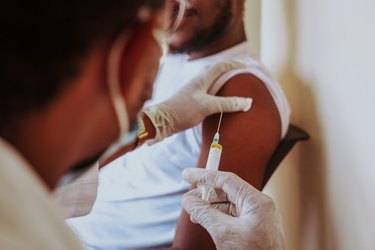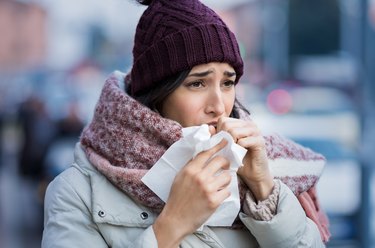
Getting your yearly flu vaccine certainly isn't the most exciting fall activity. But it's well worth it: You'll protect yourself and your community from this seasonal illness. And if you get side effects, they'll be a lot easier to tolerate than getting the flu itself.
"The flu is a very significant illness," says Georges C. Benjamin, MD, executive director of the American Public Health Association. "It still puts thousands of people in the hospital every year and it kills thousands of people." Getting vaccinated greatly lowers your risk for both of those outcomes.
Video of the Day
Video of the Day
Still, some people hesitate to get vaccinated each fall because of the fear of side effects. "The side effects from the flu vaccine are extraordinary mild," Dr. Benjamin says. "Most people tolerate it very well."
Common side effects from the flu vaccine may include the following, according to the Centers for Disease Control and Prevention (CDC):
- Soreness, redness and swelling at the injection site
- Headache
- Itching at the injection site
- Fever
- Nausea
- Muscle aches
According to the CDC, side effects of the flu nasal spray may also include runny nose, wheezing, sore throat and cough.
Don't panic, though. These effects are normal, usually mild and short-lived. Side effects from the flu shot typically only last a day or two.
Still, you'll want to do what you can to feel better, so here's how to relieve flu shot side effects.
Tip
Because the flu virus changes every year, the vaccine must change too. That's why you might get side effects some years but not others, Dr. Benjamin says.
1. Ice the Injection Site
Pain, redness, itching and a little soreness in your shoulder is common, Dr. Benjamin says, and could last up to five days after the shot.
"That's not an allergic reaction," he clarifies. "It's the first evidence that the body has absorbed the medication and is using it to train your body to fight off infection."
Icing the area can help calm soreness, swelling, bruising and any rash-like redness.
"The goal is to cool down the area," says Margot Savoy, MD, MPH, associate professor of family and community medicine at the Katz School of Medicine at Temple University and senior vice president of education for the American Academy of Family Physicians (AAFP).
But here's the catch: Don't do it right away. "You don't want to shut down the blood vessels too soon," says Dr. Savoy, who completed a postdoctoral fellowship in vaccine science with the AAFP. "If you put ice on too soon, it will take longer [for your body] to absorb the vaccine."
Here's how to do it, she says:
- Wait 6 to 8 hours after the injection.
- Apply an ice pack, bag of frozen veggies or a cool washcloth to your skin for up to 15 minutes. If you're using an ice pack, place a towel or washcloth between the ice and your skin.
- Wait an hour. If you still have swelling, apply the ice again for up to 15 minutes.
- Repeat until the swelling has gone down.
Even if you don't ice the area, the swelling and soreness will eventually go away on its own, Dr. Savoy says.
2. Move Your Arm
Keeping your arm moving with some gentle arm exercises may help decrease pain, swelling and arm tingling or numbness at the injection site, according to the Cleveland Clinic.
You could even lift light weights to help relieve arm soreness.
3. Take an Antihistamine
For itching at the injection site, Dr. Savoy says you could take an antihistamine such as loratadine — the active ingredient in products like Claritin ($19.80, Amazon) and Alavert ($21.99, Amazon).
Many companies, such as CVS, Walgreens, Walmart and Costco, also sell the generic equivalent of these over-the-counter products.
An antihistamine could also help with a runny nose caused by the flu vaccine nasal spray.
Loratadine is among a group of second-generation, non-drowsy antihistamines, according to the Cleveland Clinic.
If you don't mind getting drowsy, you could take a first-generation antihistamine like Benadryl ($6.49, Amazon), which contains the active ingredient diphenhydramine.
Warning
If you're treating a child's symptoms, be sure to check with their pediatrician before giving them any kind of medication.
4. Try Acetaminophen for Flu-Like Symptoms
Can the flu shot make you sick? Flu-like symptoms like a fever are common. But that doesn't mean the shot gave you the flu. Rather, it's a sign your immune system is responding to the vaccine.
"The flu shot cannot give you the flu," Dr. Benjamin says. "It is just like any of our other vaccines designed to stimulate your immune system so you can more easily fight off the virus if infected."
Dr. Savoy explains it this way: "There are people who get an immune response, such as fever, muscle aches and fatigue. The difference is that once your body realizes you're not getting the flu, those stop. When a person has actual influenza, it can last for a week or more."
If you're sick after the flu shot, you don't have to take anything for the mild fever or muscle aches, as these symptoms will go away on their own. But if you're uncomfortable, Dr. Benjamin recommends Tylenol (acetaminophen).
"You don't have a fever until you get to 100.5," Dr. Benjamin says. "You shouldn't worry about it until it gets to 103. If it doesn't come down with Tylenol after one or two days, you should call your doctor."
Some research suggests it's best to avoid over-the-counter pain and fever-reducers classified as nonsteroidal anti-inflammatories (NSAIDs). Ibuprofen (Advil), aspirin and naproxen (Aleve) may reduce the body's ability to make the antibodies that protect against the flu, according to the University of Rochester Medical Center.
Ultimately, not everyone has symptoms after the flu shot; these side effects vary from person to person.
What to Avoid After a Flu Shot
Other than NSAIDs, there isn't anything you should necessarily avoid after getting a flu shot. There is no research to suggest that any foods or drinks are off-limits, and you can take your prescribed medications as advised.
Talk to your doctor if you're unsure about what over-the-counter medications you can take after getting vaccinated.
When to See a Doctor
Typically, side effects of the flu vaccine go away after a few days on their own. If they last longer than a week, or your symptoms are severe, you should call your doctor.
However, authors of a January 2018 review in Human Vaccines and Immunotherapeutics evaluated all the safety data and concluded: "Severe allergic reactions to influenza vaccines are very rare, being estimated at less than 1 in a million doses."
Still, the CDC says to call a doctor if you have any of these rare, serious reactions after getting the flu vaccine:
- Breathing problems
- Hoarseness or wheezing
- Hives
- Paleness
- Weakness
- A fast heartbeat
- Dizziness
Keep in mind, you can also experience side effects like dizziness from the flu, so it's important to mention all of your symptoms to your doctor. They can help you with flu recovery.
What About Guillain-Barré Syndrome?
Guillain-Barré syndrome (GBS), a rare neurological disorder that causes temporary weakness and paralysis in some parts of the body, has been linked to a very small number of flu vaccines, according to the Mayo Clinic.
According to the CDC, "if there is an increased risk of GBS following flu vaccination it is small, on the order of one to two additional GBS cases per million doses of flu vaccine administered."
"While it can seem scary, the most common reason people get it is another infection," Dr. Savoy says. "I wouldn't spend time worrying about getting Guillain-Barré from the flu vaccine."
In a December 2019 study in the Journal of Translational Internal Medicine, the authors concluded, "the complication of GBS due to vaccination is a rare event and thus poses very minimal risk."
In fact, research suggests you're more likely to get GBS after getting the flu than after vaccination, according to the CDC.
FAQ
Common Questions
How long does the flu shot last?
The flu shot lasts around 6 to 8 months, per Sanitas Medical Center. That's why it's recommended to get a flu shot every year in September or October, to make sure you're covered during peak flu season through the winter, per the National Council on Aging (NCOA).
Keep in mind, though, that you can still get the flu (and the flu is contagious) even if you've gotten the shot. Hopefully it will be a milder case.
How effective is the flu shot?
Flu statistics show vaccine effectiveness can vary from person to person. But recent studies have shown flu vaccination reduces the risk of getting sick by 40 to 60 percent among the overall population during flu seasons, per the CDC.
Remember, the flu vaccine is not 100 percent effective; there is still a chance you could get the flu. However, it will typically be a milder case and will be less likely to require hospitalization.
Who should not get the flu shot?
While most people ages 6 months and older can get the flu shot, there are certain groups of people who should avoid the flu vaccine. These include the following, per the CDC:
- People with severe allergies to any of the ingredients in the flu vaccine, including gelatin, antibiotics and other ingredients
- People who have had a severe allergic reaction to a dose of the flu vaccine in the past
You should also talk to your doctor about whether you can get a flu vaccine if you have Guillain-Barré Syndrome or are not feeling well prior to the vaccination, per the CDC.
Tip
People with egg allergies should get the flu vaccine, according to the CDC. Although most flu shots are made using egg-based technology and contain a small amount of egg proteins, research shows people with egg allergies are unlikely to have a severe allergic reaction to the flu vaccine.
- The American Journal of Medicine: "Frequency of Adverse Reactions After Influenza Vaccination"
- CDC: "Seasonal Influenza (Flu)"
- CDC: "Possible Side-Effects From Vaccines"
- CDC: "Flu Vaccine Safety Information"
- CDC: "Live Attenuated Influenza Vaccine [LAIV] (The Nasal Spray Flu Vaccine)"
- CDC: "Flu Vaccine and People with Egg Allergies"
- CDC: "Misconceptions about Seasonal Flu and Flu Vaccines"
- Human Vaccines & Immunotherapeutics: "Influenza vaccines: Evaluation of the safety profile"
- Journal of Translational Internal Medicine: "Influenza Vaccination and Guillain–Barré Syndrome: Reality or Fear"
- CDC: "Guillain-Barré syndrome and Flu Vaccine"
- National Council on Aging: "What Older Adults Need to Know During Flu Season"
- CDC: "Who Should & Who Should NOT Get Vaccinated"
- Mayo Clinic: "Guillian-Barré Syndrome"
- Sanitas Medical Center: "How Long Does the Flu Shot Last?"
- Cleveland Clinic: "Why Vaccine Shots Can Hurt and How To Prevent It"
- Cleveland Clinic: "Antihistamines"
- University of Rochester Medical Center: "Getting a Flu Shot? Skip the Advil, Aleve, for Mild Discomfort"
- CDC: "Benefits of the Flu Vaccine"
Is this an emergency? If you are experiencing serious medical symptoms, please see the National Library of Medicine’s list of signs you need emergency medical attention or call 911.




